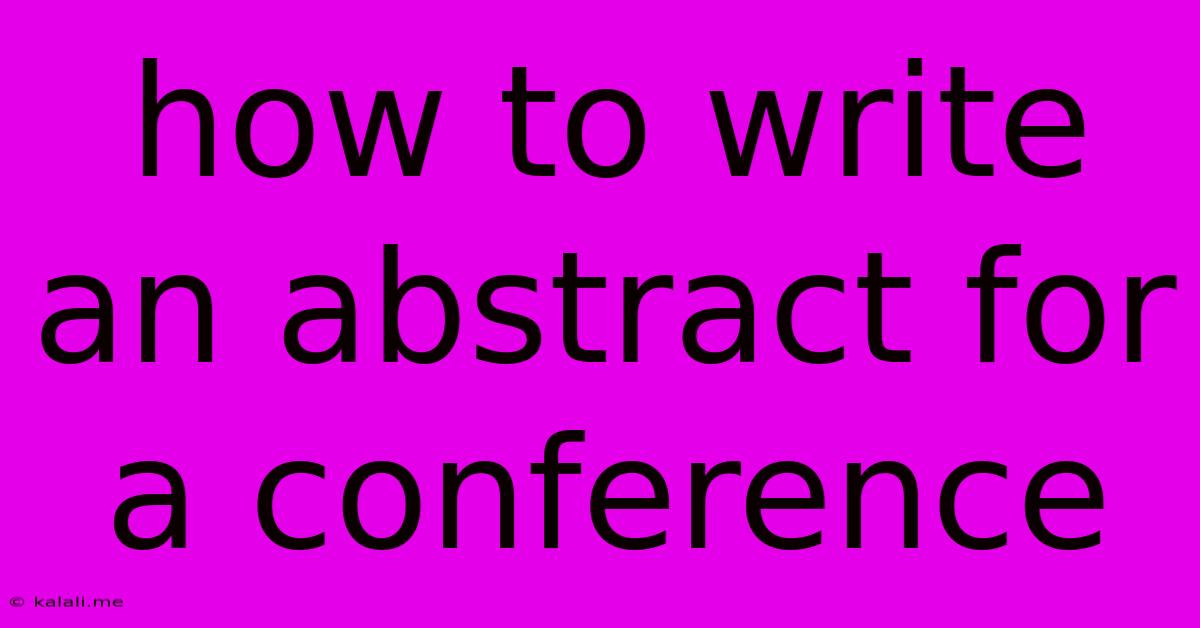How To Write An Abstract For A Conference
Kalali
Jun 08, 2025 · 3 min read

Table of Contents
How to Write a Compelling Conference Abstract That Gets Accepted
Getting your research accepted for a conference is a significant achievement, and a well-crafted abstract is your first hurdle. This comprehensive guide will walk you through the process of writing a compelling abstract that grabs the attention of the review committee and increases your chances of acceptance. Think of your abstract as a concise and impactful advertisement for your research.
What is a Conference Abstract?
An abstract is a concise summary of your research paper, typically ranging from 150 to 300 words. It provides a brief overview of your research question, methodology, findings, and conclusions. It’s the first – and sometimes only – impression your work will make on potential attendees and reviewers. A strong abstract is clear, concise, persuasive, and accurately reflects the content of your full paper.
Key Elements of a Winning Conference Abstract:
-
Compelling Title: Your title should be clear, concise, and informative, accurately reflecting the core of your research. Avoid jargon and overly technical language. Think about using keywords relevant to your field to improve searchability.
-
Clearly Defined Research Problem: State the problem you are addressing. Why is this research important? What gap in knowledge are you filling? This sets the stage for the rest of your abstract.
-
Methodology: Briefly describe your research methods. This section should be clear enough for the reader to understand your approach without getting bogged down in specifics. Mention key techniques, data sources, and analytical approaches.
-
Key Findings: Present your most significant findings. This is arguably the most crucial part of your abstract. Focus on the results that are most impactful and relevant to your research question. Use quantifiable data whenever possible.
-
Conclusions and Implications: Summarize your conclusions and discuss the implications of your research. What are the broader implications of your findings? How does your work contribute to the field?
-
Keywords: Include relevant keywords at the end of your abstract. This helps search engines and conference organizers categorize and index your work.
Writing Tips for a Successful Abstract:
-
Know Your Audience: Tailor your language and level of detail to the specific conference and its audience. Technical conferences may allow for more specialized terminology than interdisciplinary events.
-
Write Concisely: Avoid unnecessary jargon or overly technical language. Use clear, concise sentences and avoid ambiguity.
-
Use Strong Verbs: Use active voice and strong verbs to make your writing more dynamic and engaging.
-
Proofread Carefully: Grammar and spelling errors can significantly detract from the overall impact of your abstract. Thorough proofreading is essential.
-
Follow Submission Guidelines: Carefully review the specific guidelines provided by the conference organizers regarding length, formatting, and submission requirements. Adherence to these guidelines is crucial.
Example Abstract Structure:
While the exact structure might vary, a common approach includes:
- Introduction: Briefly introduce the research topic and its significance. (1-2 sentences)
- Methods: Describe the research methodology concisely. (2-3 sentences)
- Results: Present the key findings using quantifiable data whenever possible. (3-4 sentences)
- Discussion/Conclusion: Summarize the implications and conclusions of your research. (2-3 sentences)
Beyond the Basics: Making Your Abstract Stand Out
-
Highlight Novelty: Emphasize what makes your research unique or innovative. What is the new contribution to the field?
-
Focus on Impact: Explain the potential impact of your research on practice or policy.
-
Show, Don't Just Tell: Use data and specific examples to support your claims.
By following these guidelines and focusing on clarity, conciseness, and impact, you can significantly increase your chances of getting your conference abstract accepted and presenting your research to a wider audience. Remember, your abstract is your first impression – make it count!
Latest Posts
Latest Posts
-
How To Get Mats Out Of Cat Fur
Jun 08, 2025
-
Should You Double Seal Vacuum Bags
Jun 08, 2025
-
How To Remove Gasoline Smell From Hands
Jun 08, 2025
-
How To Find Limits On A Graph
Jun 08, 2025
-
Write An Equation For The Function Graphed Below
Jun 08, 2025
Related Post
Thank you for visiting our website which covers about How To Write An Abstract For A Conference . We hope the information provided has been useful to you. Feel free to contact us if you have any questions or need further assistance. See you next time and don't miss to bookmark.